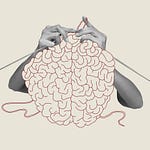Here is the second chapter of Taking Heart and Making Sense.
If you’re new here, you might like to read an intro article about the book. I also recommend listening to the book’s Introduction and Chapter One first.
A transcript is available with each chapter. Alternately, if you’d like the full text, paid subscribers receive the entire ebook (even if you only subscribe for one month).
In this second chapter I do my best to offer an accessible account of a highly influential theory of metaphor that began with Metaphors We Live By, by pioneers George Lakoff and Mark Johnson. Indeed, this now-classic book may even have kicked off the whole field of embodied cognition. Either way, I understand metaphor theory as a prominent stream within embodied cognition, and this theory has certainly inspired an enormous amount of research in philosophy, linguistics, neuroscience and beyond.
My life has involved long periods of intensive study and research, alternating with years where I have been more engaged with other things: immersing myself in meditation, training in bodywork or just keeping myself afloat outside of any sort of ordinary career trajectory. In hindsight, these times of deeper involvement with experiential learning or just plain living were also times of consolidation. They provided spacious periods of reflection in which I could naturally sort through themes and ideas to find which felt the most relevant to my embodied, everyday life.
During these phases, I would often park some theories for exploration later, while I lost interest in others. But I would also notice, incrementally over years, that just a few ideas had profoundly shifted my thinking, including my perception and perhaps even my experience. This theory of metaphor is one of those profound influences on me, well beyond the intellectual.
For those of you reading and listening to my book who might not be familiar with any of these fields, let me share what I love about these ideas about metaphor. Many of us are currently wrestling with conceptual issues about objectivity, truth and experience. Even when we’re not aware of it, that struggle permeates contemporary life. In this life a forced choice seems to have emerged between the concept of impartial knowledge without any value (the objectivitiy of science) and the notion of many competing values with equal claims to truth (the subjectivity of individual experience). Many people feel forced to pick a team, when neither of these, by themselves, are adequate to describe the whole of reality or the entirety of human experience.
Thinking about metaphor is one way of beginning to loosen the grip of those polar opposites, the objective and subjective. We find that understanding (which at its apex we assume to be objective) is scaffolded on experience, which is scaffolded on understanding, and so on. Understanding metaphor is useful because we initially think of it as a language-based phenomenon, but this metaphor theory describes a process of interleaving experience and understanding that goes beyond language. At the same time, beginning with language makes it relatively easy to find examples, and reflect on them in a way that can help us to observe our own, personal experience as well as our shared understanding, through words and concepts.
If reflecting on language and how it interacts with experience seems onerous (and I fully understand that it might be for some readers) I offer a single idea to take from this chapter. When you turn your attention to your personal experience, it feels ongoing and continuous. It’s inward, subjective nature might even be quite difficult to point to. But despite that very personal experience that you are in you manage to live in a fairly shared world, and to have a basic sense of who you are, what’s going on and what you need to do. At a fundamental level, you understand what happens because you recognise structure in your experience. That’s another way of saying that you understand what happens because you’ve been in many similar situations before and you can project the structure of one situation onto another. Because that recognition happens mostly unconsciously (you’re not usually aware of the structure itself) language is a great place to start unpacking how experience is structured, how that then gives rise to understanding, and how that then influences experience.
Quick overview:
This chapter describes a central idea in George Lakoff and Mark Johnson’s Metaphors We Live By, that metaphor organises our understanding and our experience by projecting from phenomena that are more clear to phenomena that are less clear. Often this projection is from physical to non-physical phenomena. Even so, we cannot assume that some experiences are more basic than others.
Metaphor as a projection is easiest to understand through examples. We can also relate metaphor to our natural ability to form categories as we learn to make sense of the world.
I then provide a short overview of Mark Johnson’s concept of image schemata (the structures of our understanding) and offer preliminary reflections on how his view, and metaphor theory generally, might relate to Lisa Feldman Barrett’s view of emotion concepts.
I argue that the notion of feeling (or affect) seems to have become more important as metaphor theory has developed, but remains not quite integrated. I suggest that this problem points to the need for a different underlying philosophical framework, which my book will attempt to develop.














Share this post